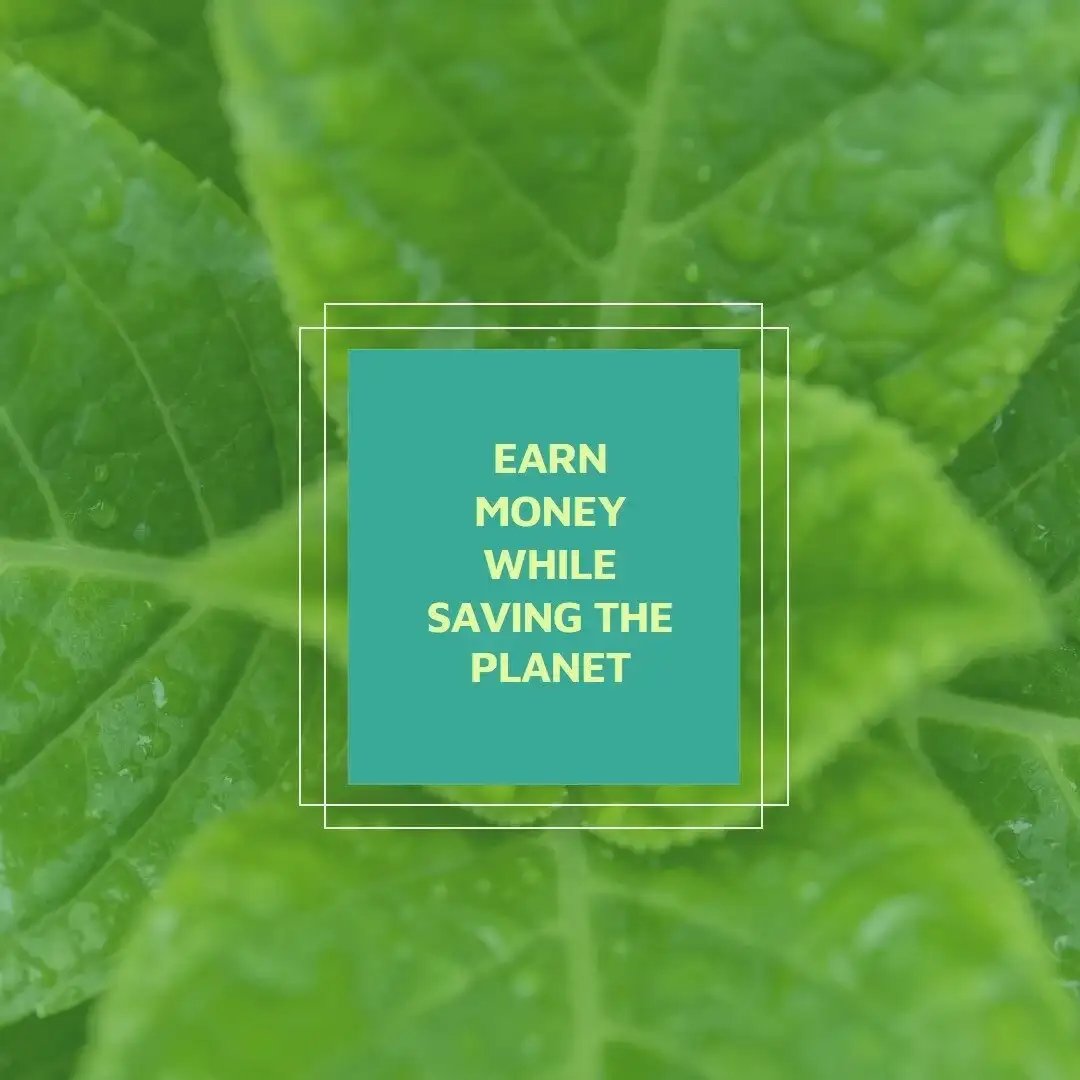Recycling has long been regarded as an environmentally responsible practice that can help reduce waste and conserve resources. However, many people are also curious about the financial benefits of recycling. Is it worth the time and effort to recycle in order to save or even earn some extra cash? Let’s explore the facts.
List of items you can recycle for Money (Table):
| Item | Description |
|---|---|
| 1. Cans | Metal cans, such as aluminum or steel used for beverages, can be recycled for cash. In the U.S., around 5 million cans are discarded every hour. Recycling cans, paying around five to 10 cents per can, is an easy way to earn money. Collect empty cans, rinse them, and take them to a recycling center or participate in community events. |
| 2. Glass Bottles | Glass bottles are 100% recyclable. They can be melted down and reshaped into new products. Collect empty bottles, remove caps, and rinse them. Sort by color and take them to a recycling center for cash. Some states have deposit refund systems, offering a refund per bottle. |
| 3. Plastic Bottles | Plastic bottles, with the growing awareness of plastic pollution, can be recycled for money. Collect empty bottles, remove caps, and rinse them. Sort by plastic code and take them to a recycling center. Some states offer bottle deposit refund systems. |
| 4. Scrap Metal | Scrap metal, including copper and aluminum, can be lucrative. Identify metal types, find a local scrap yard, and sell them. Prices fluctuate, so stay informed. Recycling metal reduces waste, conserves resources, and earns you money. |
| 5. Papers & Cardboard | Paper and cardboard are valuable recyclables. Recycling centers pay by weight. Collect newspapers, magazines, cardboard boxes, and office paper. Break down boxes, remove tape, and check recycling center requirements. Recycling paper contributes to reducing deforestation and saves energy. |
| 6. Junk Cars | Recycle old cars for valuable metals like steel and aluminum. Sell the whole car to a salvage yard or individual parts. Recycling junk cars helps conserve resources, reduces waste, and earns money. |
| 7. Clothes | Recycle old clothes for money. Sell to thrift stores, online platforms, or participate in clothing swap events. Recycling clothes reduces textile waste, extends material life, and supports a sustainable fashion industry. |
| 8. Cooking Oil | Recycle used cooking oil for money. Instead of disposal, sell it to recycling companies for biofuel production. Recycling cooking oil reduces pollution, waste, and promotes sustainable alternatives. |
| 9. Hair | Donate hair for wigs for cancer patients or to create oil absorbents for oil spills. Some organizations provide compensation for hair donations. Recycling hair contributes to various sustainable initiatives. |
| 10. Makeup Containers | Recycle makeup containers through brand or retailer programs. Earn rewards or discounts by returning empty containers. Recycling makeup containers reduces waste and promotes environmental sustainability. |
| 11. Gift Cards | Sell unused gift cards online or trade them for ones you’ll use. Gift card exchange platforms offer cash or credit. Recycling gift cards helps declutter and turns unused cards into value. |
| 12. Electronics | Recycle old electronics through buyback programs or retailers. Trade in smartphones, laptops, or gaming consoles for cash or store credit. Recycling electronics reduces electronic waste and supports sustainability. |
| 13. Cell Phones | Trade in old cell phones through carrier or manufacturer buyback programs. Sell them on online platforms dedicated to used electronics. Recycling cell phones helps reduce electronic waste and promotes sustainability. |
| 14. Car Batteries | Recycle car batteries for cash. Auto parts stores and recycling centers often have programs. Recycling car batteries prevents environmental harm and reduces the need for new production. |
| 15. Ink Cartridges | Recycle ink cartridges for store credit or cash rewards at office supply stores. Online retailers may also offer incentives. Recycling ink cartridges reduces environmental impact and saves resources. |
| 16. Wine Corks | Recycle wine corks at wineries or through online platforms for cash. Corks can be repurposed into various products. Recycling wine corks reduces waste and supports sustainability. |
| 17. Holiday Lights | Recycle holiday lights for money. Many recycling centers and scrap yards accept them. Recycling lights reduces waste and promotes sustainability. |
| 18. Toys | Recycle old toys for money. Many recycling centers and second-hand stores accept them. Recycling toys reduces waste and allows others to enjoy them. |
| 19. Bed Sheets | Sell old bed sheets to second-hand stores or repurpose them into new items for sale. Recycling bed sheets reduces waste and gives them a new purpose. |
| 20. Tennis Balls | Sell used tennis balls to pet owners or through online platforms. Some programs repurpose them into new products. Recycling tennis balls reduces waste and promotes sustainability. |
| 21. Organic Waste | Turn kitchen waste into compost and earn cash. Many communities offer composting programs. Recycling organic waste reduces landfill waste and provides nutrient-rich soil. |
Benefits of Recycling for Money
Recycling can indeed offer financial benefits, both for individuals and businesses. Here are some key points to consider:
- Cost savings: Recycling reduces the need for new raw materials, which can be expensive to extract and process. By using recycled materials, businesses can lower their production costs and pass on the savings to customers. Similarly, individuals can save money by purchasing second-hand items or products made from recycled materials.
- Earn cash: In some cases, recycling can actually generate income. Certain recyclable materials, such as aluminum cans or scrap metal, can be sold to recycling centers or scrap yards for cash payments. This not only helps to offset the cost of recycling but also provides an incentive for individuals to participate in the recycling process.
- Tax deductions: Making donations to charitable recycling centers or organizations can also have financial benefits. Many countries offer tax deductions for contributions made to registered charities, including those involved in recycling initiatives. By donating items instead of discarding them, individuals can potentially reduce their tax liability while supporting a good cause.
Concept of Turning Trash into Cash
The saying “one man’s trash is another man’s treasure” holds true when it comes to recycling for money. Through the process of waste diversion, unwanted items can be transformed into valuable resources. Here’s a breakdown of the steps involved:
- Seek out a recycling center or collection point: Find local recycling facilities or drop-off points that accept the materials you want to recycle. Many towns and cities have dedicated recycling centers where you can bring your recyclables.
- Prepare the items for recycling: Before recycling, it is important to prepare the items according to the center’s specifications. This may involve washing and sorting the materials to ensure they meet the recycling facility’s requirements.
- Make a tax-deductible donation vs. receiving a cash payment: Depending on the materials being recycled and local regulations, individuals may have the option to donate items to a charitable organization or receive a cash payment for certain recyclables. Consider the potential tax benefits and personal preference when deciding which option to choose.
Re-cycling can have financial benefits, including cost savings, cash payments, and tax deductions. It offers individuals and businesses an opportunity to not only protect the environment but also contribute to their financial well-being.
Infographics: List of items you can recycle for money
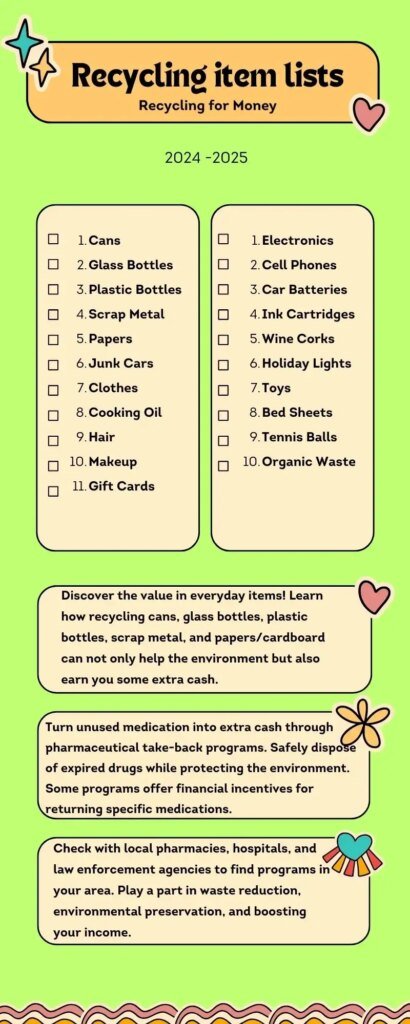
Find out why Recycling Should be Mandatory
Cans
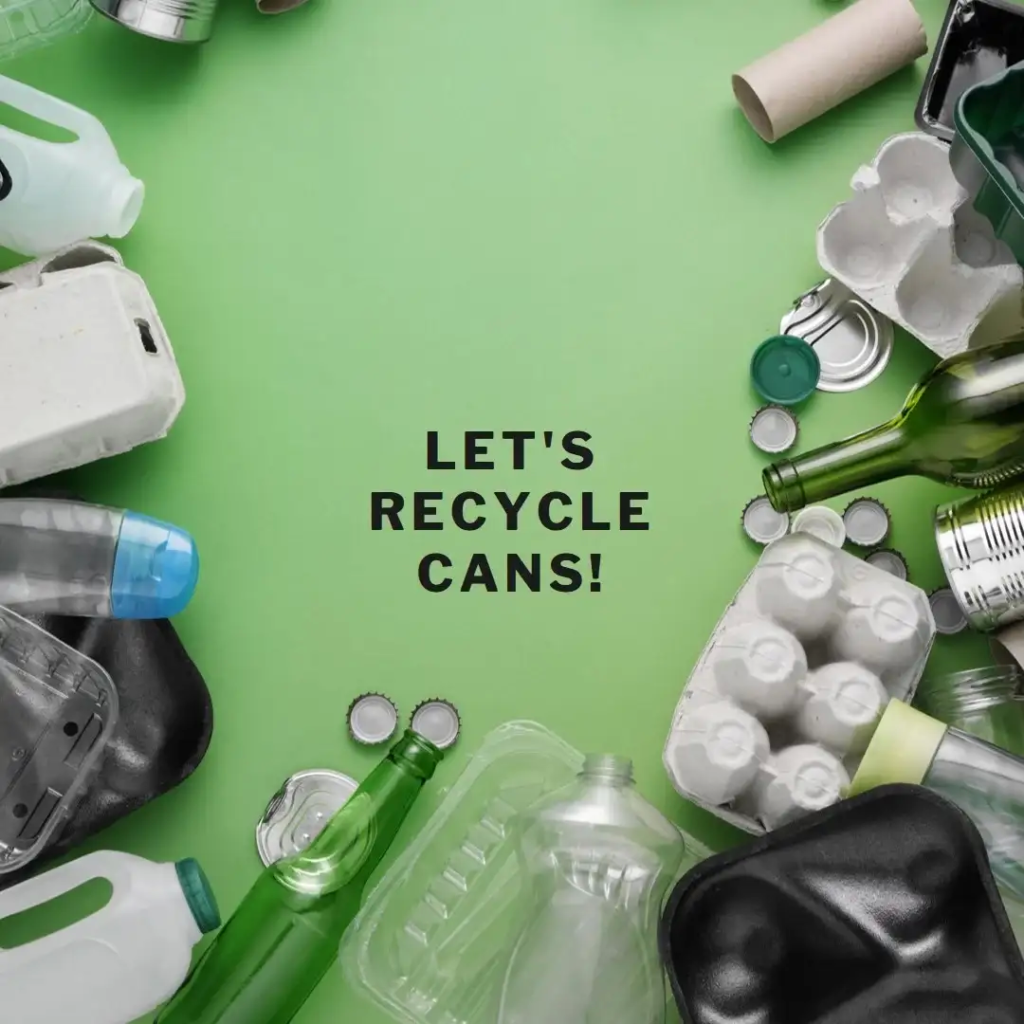
Did you know that certain everyday items can be recycled for cash? One example is metal cans, such as aluminum or steel cans commonly used for beverages. In the United States alone, approximately 5 million metal cans are thrown away every hour. By recycling metal cans, you can earn around five to 10 cents per can, depending on its size.
To recycle cans for money, start by collecting empty beverage cans from your home or office. Make sure to rinse them out to remove any residue. Then, find a local recycling center or scrap yard that accepts aluminum cans. They will typically pay you for each pound of cans you bring in.
You can also participate in community recycling events or set up your own can collection drive. Some states even offer a deposit refund system where you can return cans to certain locations and receive a small refund per can.
Recycling cans not only helps reduce waste and conserve resources, but it also allows you to make a positive impact while earning some extra money. So, start collecting those cans and make a difference today!
Glass Bottles

Glass bottles are another valuable item that you can recycle for money. Glass is 100% recyclable, meaning it can be melted down and reshaped into new bottles or other glass products. Recycling glass not only helps conserve energy and resources but also reduces the amount of waste in landfills.
To recycle glass bottles for money, start by collecting empty glass bottles from your home or workplace. Remember to remove any caps or lids and rinse out the bottles to remove any residue. Sorting the bottles by color, such as clear, brown, or green, can also increase their value.
Once you have a collection of glass bottles, find a local recycling center or drop-off location that accepts glass. They will typically pay you based on the weight of the glass you bring in. Some states even have bottle deposit refund systems in place, where you can return glass bottles to designated locations and receive a refund per bottle.
By recycling glass bottles, not only can you earn some extra cash, but you can also contribute to a more sustainable and eco-friendly future. So start gathering those glass bottles and make a positive impact today.
Plastic Bottles

Plastic bottles are one of the most commonly used items that can be recycled for money. With the growing awareness about plastic pollution and the need for environmental sustainability, recycling plastic bottles has become not only an eco-friendly choice but also a profitable one.
To recycle plastic bottles for money, start by collecting empty plastic bottles from your home or workplace. Make sure to remove any caps or lids and rinse out the bottles to eliminate any residue. Sorting the bottles by their plastic code, usually found on the bottom of the bottle, can also help increase their value.
Once you have a collection of plastic bottles, find a local recycling center or drop-off location that accepts plastic. They will typically pay you based on the weight of the plastic you bring in. Some states even have bottle deposit refund systems in place, where you can return plastic bottles to designated locations and receive a refund per bottle.
Scrap Metal

Another item that can be recycled for money is scrap metal. Scrap metal, such as copper and aluminum, can be quite lucrative to sell. At some scrap yards, you can fetch over $2 per pound for copper and 40 to 70 cents per pound for aluminum. This presents a great opportunity to not only make some extra cash but also contribute to reducing waste and conserving resources.
To begin recycling scrap metal, start by identifying the type of metal you have. Common types include copper, aluminum, brass, and steel. Once you have separated the different metals, you can find a local scrap yard or recycling center that accepts them.
The value of scrap metal fluctuates based on market demand and the purity of the metal. So, it’s a good idea to keep an eye on current prices before selling. Remember to call ahead and inquire about any specific requirements or procedures the scrap yard may have.
Papers & Cardboard

Paper and cardboards are also valuable recyclable materials that can be turned into cash. Recycling paper and cardboard has been a common practice for many years, and it offers both environmental and financial benefits.
Paper and cardboard recycling centers pay for the material by weight. The pricing may vary depending on the quality and type of paper or cardboard. By collecting and recycling items such as newspapers, magazines, cardboard boxes, and even office paper, you can contribute to reducing deforestation, saving energy, and earning some money in the process.
To recycle cardboard, start by breaking down the boxes and removing any tape or non-cardboard materials. Most recycling centers accept cardboard, but it’s a good idea to call ahead and check their requirements. Some recycling centers may have size limitations or specific drop-off locations for larger quantities.
The value of recycled cardboard depends on various factors, such as the quality and amount of cardboard you have. Typically, you can receive payment based on the weight of the cardboard you bring in. This can range from a few cents to several dollars per pound.
Junk Cars
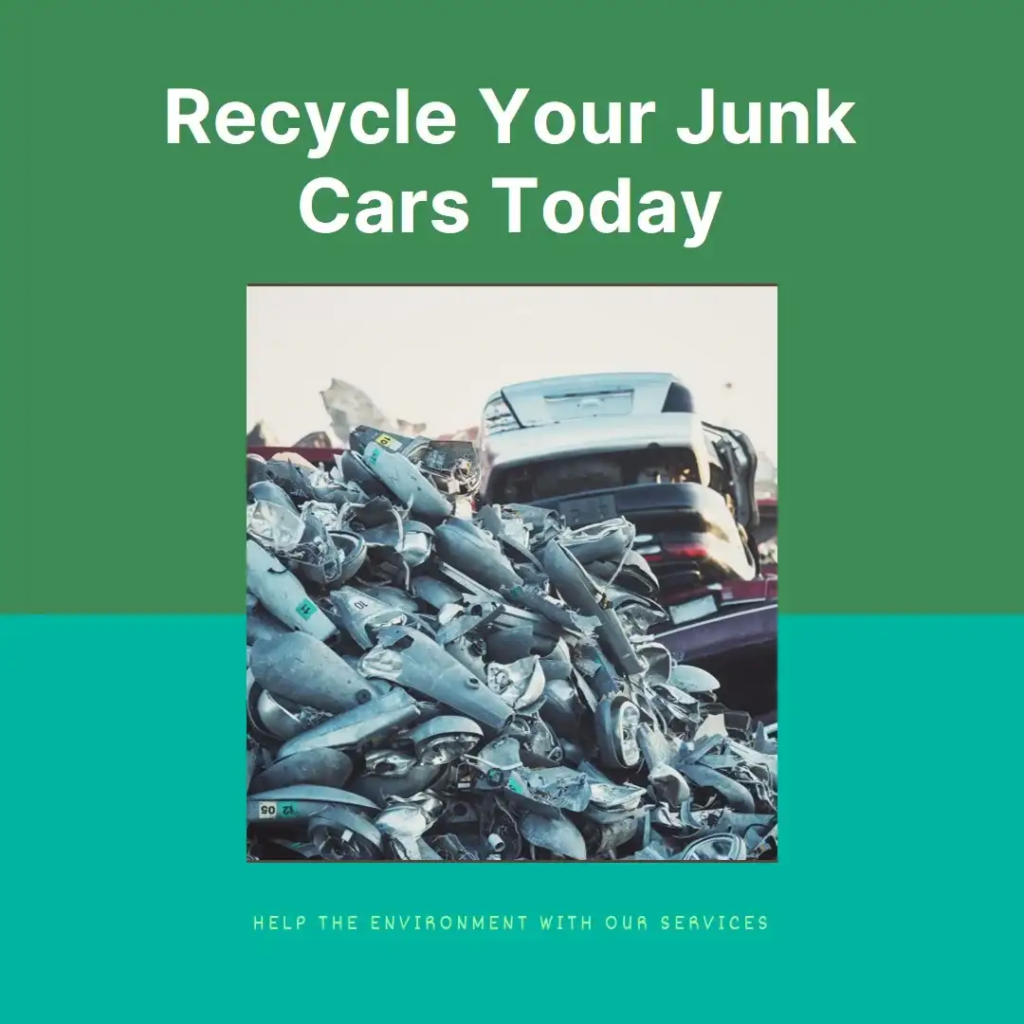
If you have an old, unwanted car sitting in your garage or driveway, don’t let it go to waste. You can actually recycle it for money! Junk cars can be a valuable source of recyclable materials, such as steel, aluminum, and various other metals.
There are several ways to recycle junk cars for money. One option is to sell the entire car to a salvage yard or scrap metal dealer. They will assess the car’s value based on its condition and the current market prices for metal. Another option is to sell individual parts of the car, such as the engine, tires, or catalytic converter, to auto repair shops or online platforms.
Recycling junk cars not only helps you earn some extra cash, but it also has environmental benefits. By recycling the metal components, you contribute to reducing the need for new raw materials and the energy required for manufacturing. So, turn that old junk car into cash and contribute to a greener future.
Clothes
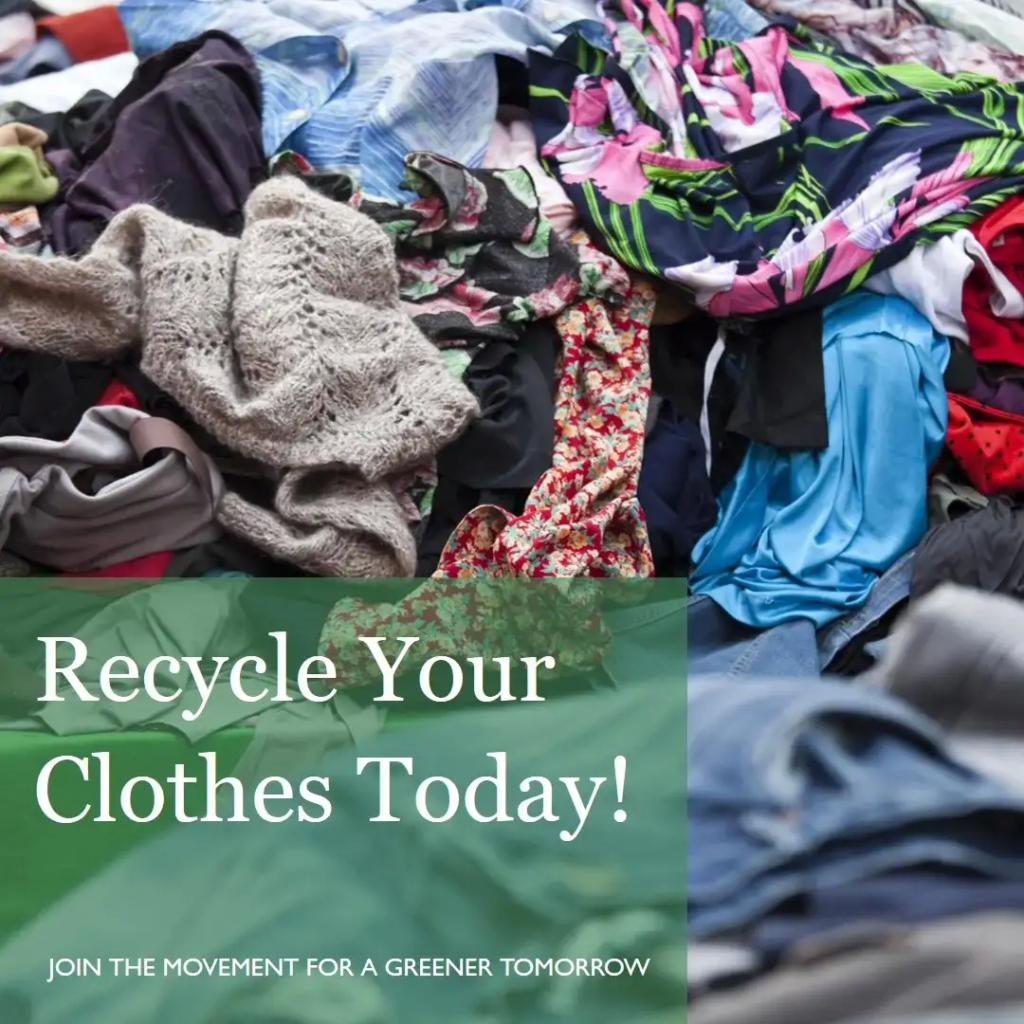
Did you know that you can recycle your old clothes for money? It’s true! Instead of letting your unwanted garments take up space in your closet, consider selling them to thrift stores or online platforms that specialize in secondhand fashion. These businesses will often pay you for your gently used clothing items, and you’ll help reduce textile waste in the process.
Another option for recycling clothes is to participate in clothing swap events or consignment sales. These events allow you to exchange your clothes with others or sell them for a commission. Additionally, some companies even offer cash incentives for donating clothes to their recycling programs.
Recycling clothes not only helps you make some extra money, but it also contributes to a more sustainable fashion industry. By giving your clothes a second life, you reduce the demand for new garments, which helps conserve resources and minimize pollution.
Household Items

Recycling household items not only helps protect the environment but also presents an opportunity to earn extra cash. Here’s a comparison of the benefits of recycling different household items:
| Item | Benefits |
|---|---|
| Electronics and Appliances | Protects the environment, reduces waste, conserves resources, and offers a chance to make money through buyback programs, selling, or recycling valuable materials. |
| Textiles (Clothing) | Diverts clothing from landfills, extends the life cycle of textile materials, reduces the demand for new clothing production, and provides an opportunity to earn cash through recycling or selling. |
| Glass Bottles and Jars | Reduces glass waste, conserves energy, saves natural resources, and offers cash refunds or incentives in some areas for recycling these items. |
By choosing to recycle these household items, you actively contribute to a sustainable future while also benefiting financially.
So, next time you clean out your closet, consider recycling your old clothes for money and make a positive impact on the environment at the same time.
Cooking Oil

Did you know that you can recycle your used cooking oil for money? It’s true! Instead of pouring it down the drain or throwing it in the trash, you can sell it to recycling companies that specialize in converting used cooking oil into biofuel.
Recycling cooking oil not only helps the environment by reducing pollution and waste, but it also provides a valuable resource for biofuel production. Biofuels are a sustainable alternative to traditional fossil fuels, and recycling cooking oil helps to decrease our reliance on finite resources while reducing greenhouse gas emissions.
To recycle your cooking oil, you can find local recycling centers or organizations that accept used oil. Some places may even offer to pick up your oil for free or provide compensation for larger quantities. Just make sure to store your used cooking oil in a sealed container to prevent spills or leaks.
Hair

Believe it or not, you can recycle your hair and even make some money while doing it. Hair is a valuable resource that can be repurposed in various ways. One popular method is donating hair to organizations that make wigs for cancer patients. These organizations accept hair donations of at least 8 inches in length and in good condition. Not only are you helping someone in need, but some organizations also provide compensation for your hair donation.
But hair recycling doesn’t stop at wigs. Hair can also be used to make oil absorbents, which are highly effective in cleaning up oil spills. Companies that specialize in oil spill cleanup often accept hair donations to create these absorbents.
So, instead of throwing away your hair after a haircut, consider recycling it. You’ll not only be helping others but also contributing to a more sustainable and eco-friendly future.
Makeup Containers

Makeup containers are a common item that can be recycled for money. Many beauty brands and retailers participate in recycling programs where they accept empty makeup containers in exchange for rewards or discounts on future purchases. These programs help to promote environmental sustainability by encouraging customers to recycle their makeup packaging instead of throwing it away.
When recycling makeup containers, it’s important to ensure that they are clean and free of any remaining product. Some programs may have specific requirements or guidelines for participating, so it’s always a good idea to check with the brand or retailer before sending in your containers.
In addition to the benefits of earning rewards or discounts, recycling makeup containers also reduces waste and conserves resources. By recycling these containers, the materials can be repurposed and used to create new products, reducing the need for virgin materials.
So, the next time you finish a makeup product, don’t toss the container in the trash. Instead, look for recycling programs that can help you turn it into a valuable resource and contribute to a more sustainable future.
Gift Cards
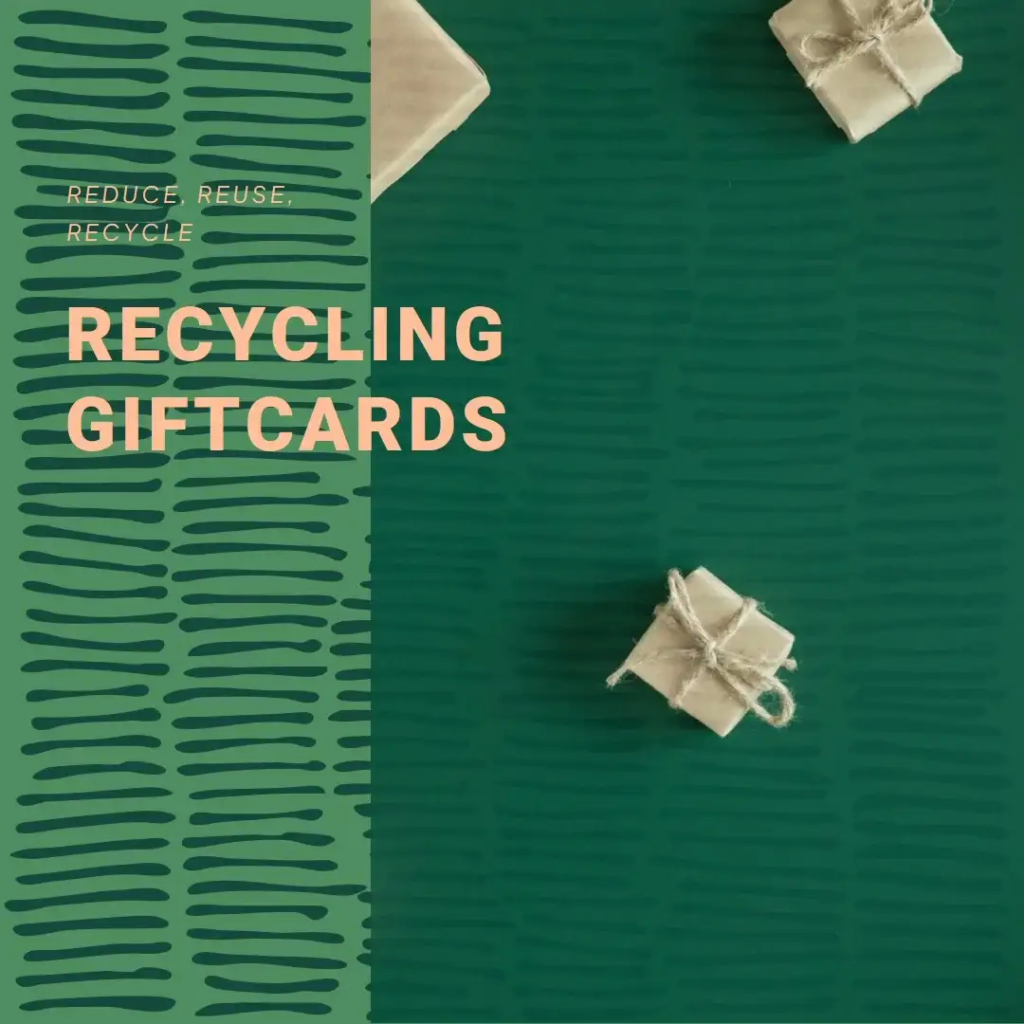
Gift cards are a popular gifting option that many people receive for special occasions, but did you know that you can also recycle them for money? Instead of letting unused gift cards gather dust in your wallet, there are several ways to turn them into cash.
One option is to sell your unwanted gift cards online through various platforms dedicated to gift card exchanges. These platforms allow you to list your gift cards and set a price, giving you the opportunity to sell them to other shoppers who are looking for discounted gift cards. You can typically receive payment in the form of cash or a check, or sometimes even receive funds directly to your PayPal account.
Another option is to trade your gift cards for ones that you will use. Some gift card exchange platforms offer the option to swap your unwanted gift cards for ones from your favorite retailers or restaurants. This way, you can still make use of the gift card value while getting rid of ones that you won’t use.
By recycling gift cards, not only can you declutter your wallet but you can also make some extra money or find the perfect gift card for yourself. So, the next time you receive a gift card that you won’t use, consider exploring your options for recycling it and turning it into something valuable.
Electronics

With technology constantly evolving and new gadgets hitting the market every year, it’s no surprise that electronics have become a major part of our lives. But what happens to those outdated devices once we’re done with them? Rather than letting them collect dust in a drawer or ending up in a landfill, you can actually recycle electronics for money.
Many recycling companies and retailers offer programs where you can trade in your old electronics in exchange for cash or store credit. These programs accept a wide range of devices, including smartphones, laptops, tablets, gaming consoles, and more. By recycling your electronics, not only are you getting rid of clutter, but you’re also helping to reduce electronic waste and promote sustainability.
Computers are another valuable item that can be recycled for cash. Some organizations accept old computers and laptops for refurbishing or dismantling for parts. You can also sell your old computer components, such as hard drives, processors, or memory, to specialized buyers.
Some electronics can even be refurbished and resold, further extending their lifespan and reducing the need for new manufacturing. So, before you toss out that old phone or laptop, consider recycling it and earning some extra money in the process. It’s a win-win situation for both your wallet and the environment.
Cell Phones

Cell phones have become an essential part of our daily lives, but what happens when we upgrade to the latest model? Rather than letting your old cell phone gather dust in a drawer, consider recycling it for money.
There are various options available for recycling your old cell phones. Many phone carriers and manufacturers have buyback programs where you can trade in your old device for cash or credit towards a new phone. These programs not only help you get rid of your old phone responsibly but also allow you to earn some extra money in the process.
Additionally, there are online platforms and recycling companies that specialize in purchasing used cell phones. These platforms offer a convenient way to sell your phone and receive payment quickly.
By recycling your cell phones, you contribute to reducing electronic waste and promote sustainability. The components of cell phones can be recycled and reused to manufacture new devices, reducing the need for raw materials and energy-intensive production processes.
So, instead of letting your old cell phone sit unused, consider recycling it for money and help the environment at the same time.
Car Batteries

Car batteries are another item that you can recycle for money. When your car battery dies, instead of tossing it in the junkyard, consider recycling it and earning some cash in the process.
The lead and acid in car batteries can be harmful to the environment if not disposed of properly. Recycling car batteries helps prevent these toxic substances from ending up in landfills and contaminating soil and water sources. Additionally, recycling car batteries reduces the need for new battery production, which requires a significant amount of energy and resources.
There are several options for recycling car batteries. Many auto parts stores, battery retailers, and automotive service centers have programs in place where you can bring your old battery and receive a refund or credit towards the purchase of a new one. Some recycling centers also accept car batteries and may offer a cash payment for them.
By recycling your car battery, you not only contribute to environmental conservation but also put some extra money in your pocket. So, next time your car battery needs replacing, be sure to recycle it responsibly and reap the benefits.
Ink Cartridges

Recycling ink cartridges is not only good for the environment but can also put some extra money in your pocket. Ink cartridges contain harmful substances that can contaminate soil and water if not disposed of properly. By recycling them, you help prevent these chemicals from ending up in landfills.
There are several ways to recycle ink cartridges and earn money. Many office supply stores, such as Staples and Office Depot, have recycling programs where you can bring in your empty cartridges and receive store credit or cash rewards. Some online retailers also offer cash or gift card incentives for recycling ink cartridges.
Not only do you contribute to environmental conservation by recycling ink cartridges, but you also reduce the demand for new cartridges to be produced. This saves valuable resources and energy. So, instead of throwing away your empty ink cartridges, consider recycling them and turning them into cash.
Wine Corks
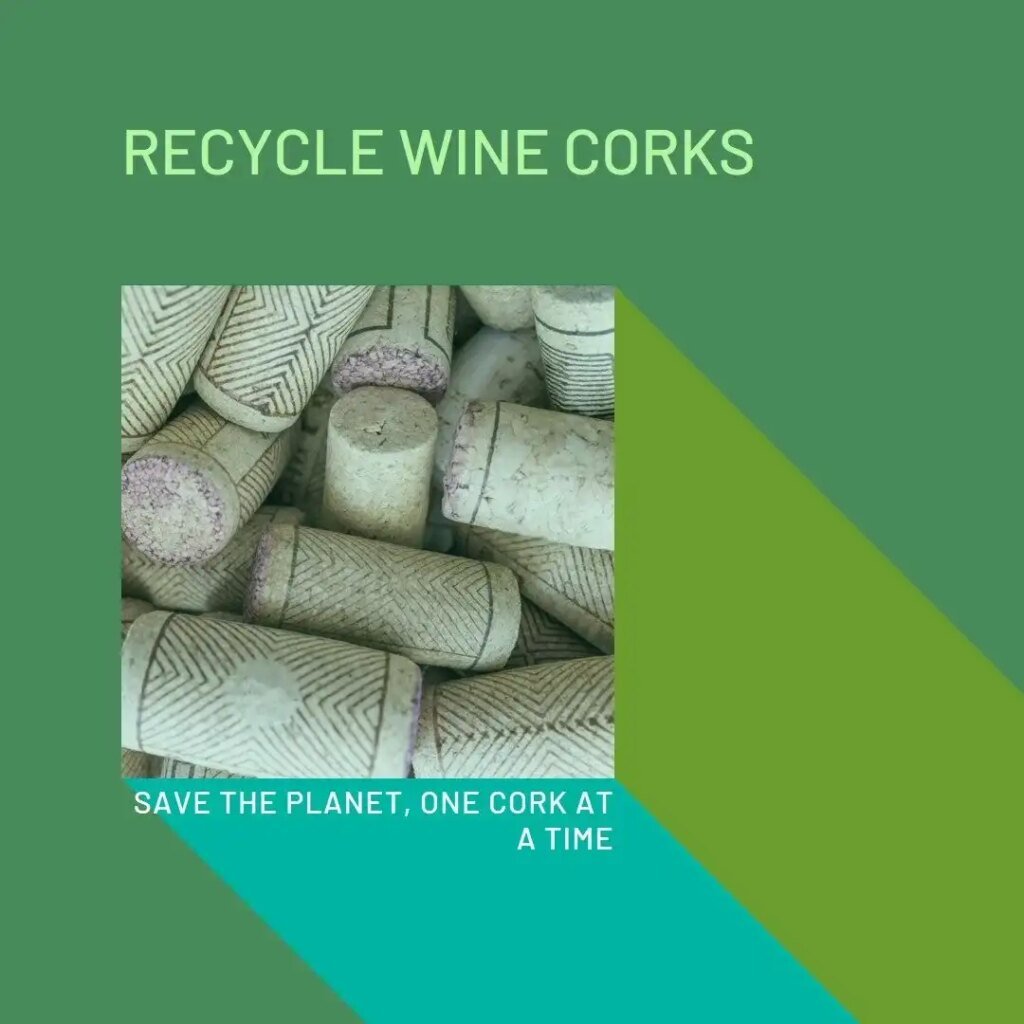
Wine corks are often overlooked when it comes to recycling, but they can actually be a valuable item that you can recycle for money. Cork is a natural and sustainable material that can be turned into a variety of products, such as flooring tiles, insulation, and even shoes.
There are several options for recycling wine corks and earning some extra cash. Many wineries and wine shops have recycling programs where you can drop off your used corks and receive a small payment for every pound. You can also find online platforms and companies that buy wine corks and pay you for sending them in.
By recycling wine corks, not only are you keeping them out of the landfill, but you are also helping to reduce the demand for new cork production. This saves the valuable resources and energy required for harvesting and producing new corks. So, the next time you enjoy a bottle of wine, remember to save the cork and turn it into cash through recycling.
Holiday Lights
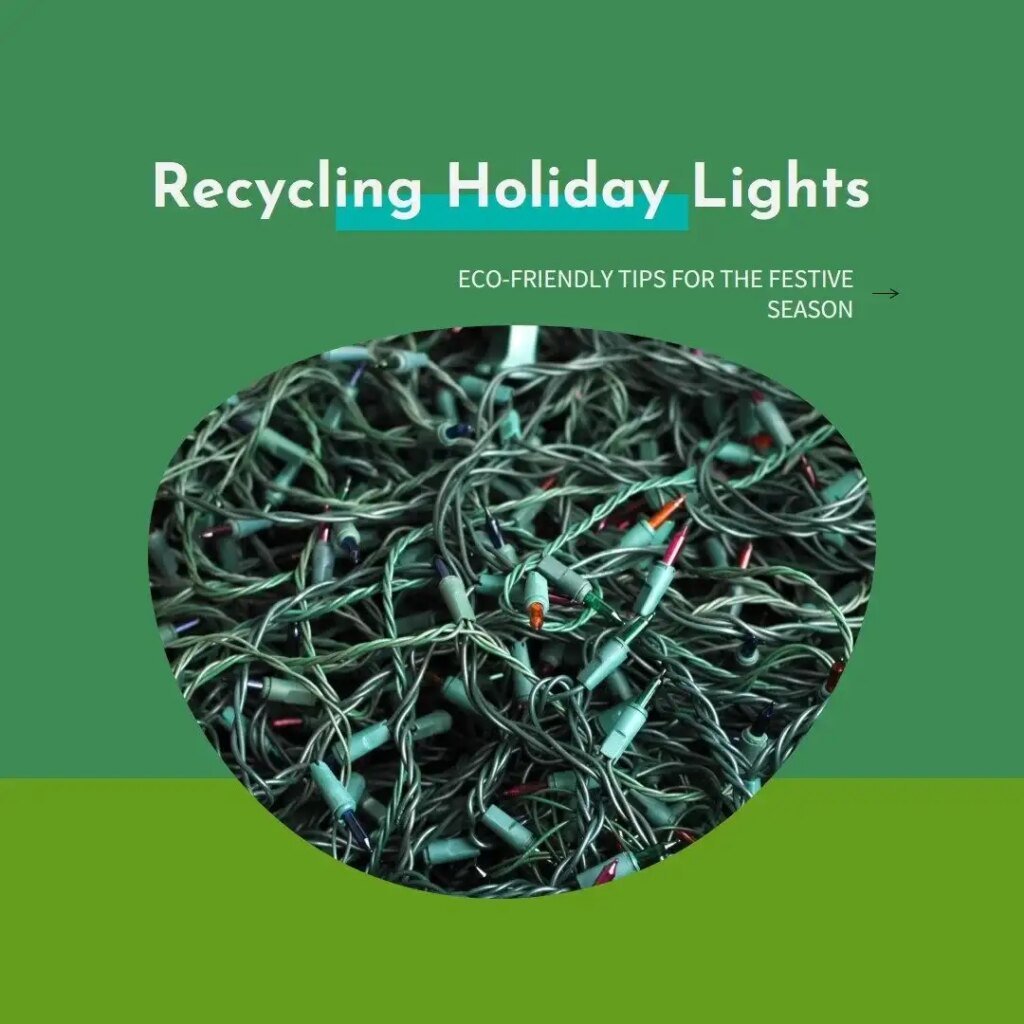
When the holiday season comes to an end and it’s time to take down those twinkling lights, don’t just toss them in the trash. Holiday lights are an item that you can recycle for money and help the environment at the same time.
Most holiday lights are made up of copper wire, plastic, and sometimes glass. These materials can be valuable when recycled properly. Many recycling centers and scrap yards accept holiday lights and will pay you for them by weight.
So instead of letting your old lights end up in a landfill, gather them up and find a local recycling center or scrap yard that accepts them. Some communities even have special collection events during the holiday season where you can drop off your old lights. By recycling your holiday lights, you are not only earning some extra cash, but you are also reducing waste and promoting sustainability.
Toys
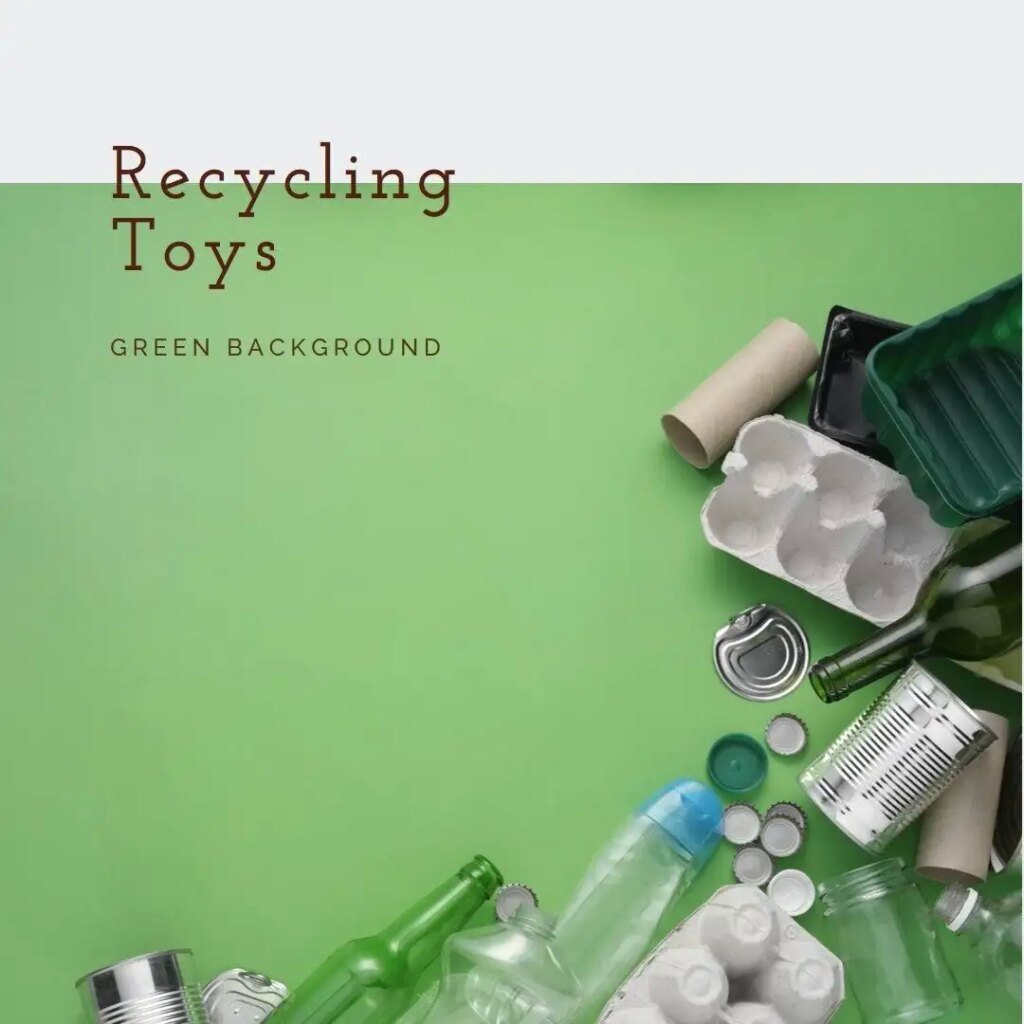
Toys are a common item that can easily pile up in your home, especially if you have children. Instead of letting them collect dust or throwing them away, consider recycling them for money. Many recycling centers and second-hand stores accept gently used toys and will pay you for them.
By recycling your old toys, you not only declutter your living space but also contribute to reducing waste. Additionally, someone else may be able to enjoy the toys that your children have outgrown or lost interest in. It’s a win-win situation, as you make some extra cash while promoting sustainability.
Before recycling your toys, make sure to clean them and remove any batteries or hazardous parts. This will make them more attractive to potential buyers and ensure that they can be safely reused or repurposed. So, gather up those old toys and help the environment while earning some money in the process.
Bed Sheets
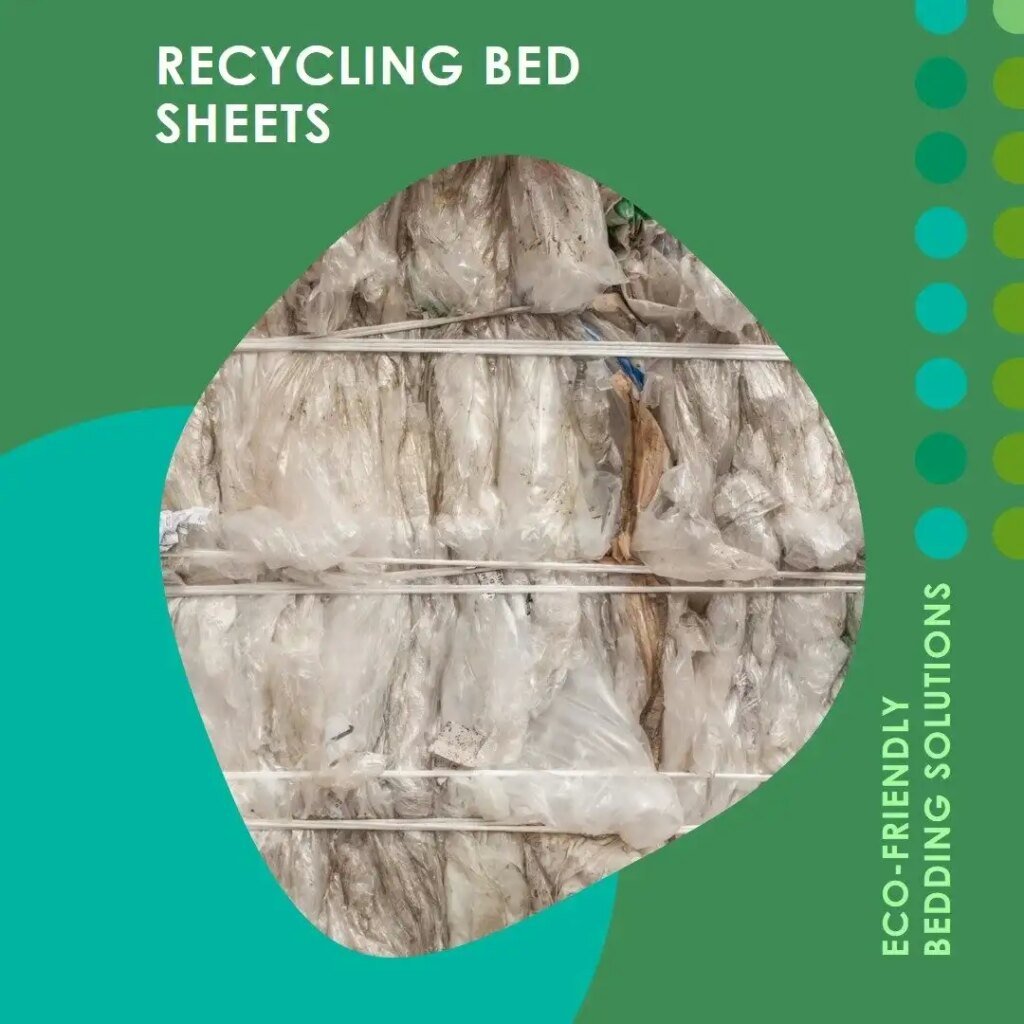
When it comes to recycling for money, one item that you may not think about is bed sheets. Instead of throwing them away when they become worn or outdated, consider recycling them for some extra cash. There are a few different ways you can do this.
One option is to sell them to a second-hand store or consignment shop that accepts bedding. These stores often have a market for gently used bed sheets, especially if they are in good condition and made from high-quality materials.
Another option is to repurpose your old bed sheets. Get creative and turn them into something new like curtains, pillowcases, or even reusable shopping bags. You can sell these handmade items online or at local craft fairs.
By recycling your old bed sheets, not only do you make some money, but you also reduce waste and give new life to something that would have otherwise ended up in a landfill. So, gather up those old bed sheets and start recycling for cash!
Tennis Balls

When it comes to recycling for money, one item that you may not have considered is tennis balls. Instead of throwing them away after they lose their bounce, there are actually several ways you can recycle them and make some extra cash.
One option is to sell used tennis balls to pet owners or animal shelters. Many dogs love to play with tennis balls, and selling them at a discounted price can be a win-win situation for both you and the pet owners. You can advertise them online or put up flyers in your local community.
Another option is to recycle tennis balls through specialized recycling programs. These programs collect used tennis balls and repurpose them into new products like flooring mats or playground surfaces. Some organizations even offer cash incentives or donations to charities for each tennis ball collected.
So, instead of letting your old tennis balls go to waste, consider recycling them for money. Not only will you be making some extra cash, but you’ll also be doing your part to reduce waste and give those tennis balls a new lease on life.
Organic Waste

Don’t just throw away your kitchen waste, turn it into compost and make some extra cash. Composting is a natural process that converts food scraps into nutrient-rich soil. Many communities have composting programs that allow residents to drop off their kitchen waste and receive compost in return.
To get started, collect your fruit and vegetable peels, coffee grounds, eggshells, and other organic scraps in a compost bin. Make sure to avoid meat and dairy products as they can attract pests. Place the bin in a shaded area, add some dry leaves or shredded newspaper, and occasionally turn the contents to aerate the mixture. After a few months, you’ll have valuable compost that can be used in gardens or sold to local landscapers and gardeners.
Special Recycling Programs
In addition to regular recycling, there are special programs that allow you to turn automotive waste into cash. Used motor oil can be recycled and reused instead of being disposed of improperly. Many auto parts stores and mechanics offer oil recycling services where you can drop off your used oil for a small fee or sometimes even for free. The collected oil is then cleaned and refined to be used again in various applications.
Another way to make money from automotive waste is by recycling car batteries. Many scrap yards and recycling centers pay a certain amount for old car batteries, as they contain valuable materials like lead and acid that can be reused or reprocessed.
How to Find Buy-Back Programs (and make money recycling)
By following the below step-by-step instructions, businesses and individuals can seamlessly integrate recycling practices into their routine, contributing to a greener planet while unlocking financial benefits.
1. Baling for Profit:
Businesses can significantly benefit from investing in a baler to compact recyclable materials, especially cardboard.
- Step 1: Invest in a Baler Start by investing in a baler to streamline waste management and prepare materials for sale.
- Step 2: Identify Recyclable Materials Clearly identify and separate recyclable materials, with a focus on high-value items such as cardboard.
- Step 3: Find Buyers for Bales Reach out to local recycling facilities or businesses interested in purchasing baled recyclables. Establish partnerships to sell compacted materials, turning waste into a revenue stream.
2. Buy-Back Programs:
Research buy-back programs like TerraCycle, understanding the accepted materials and rewards offered.
- Step 1: Research Buy-Back Programs Thoroughly research buy-back programs like TerraCycle, understanding the accepted materials and rewards offered.
- Step 2: Collect and Participate Start collecting specified waste items and actively participate in the chosen buy-back program. Consider setting up collection points in schools or community centers.
- Step 3: Redeem Points for Rewards Redeem earned points for cash or charitable gifts, aligning recycling efforts with supporting meaningful causes.
3. Bottle Bill States:
In states with Bottle Bills like California, Connecticut, and New York, individuals can redeem plastic and aluminum beverage containers for financial incentives.
- Step 1: Check Eligibility Verify if your state has a Bottle Bill program, as in states like California, Connecticut, and New York.
- Step 2: Collect and Redeem Collect plastic and aluminum beverage containers and redeem them at designated centers, earning 5-10 cents each.
4. Electronics Buy Back Programs:
Explore electronics buy-back programs from retailers like Gazelle, Target, and Amazon.
- Step 1: Research Programs Explore electronics buy-back programs from retailers like Gazelle, Target, and Amazon. Check with the manufacturer for potential trade-in or buy-back programs.
- Step 2: Trade-In Old Electronics Gather old electronics and participate in the buy-back program, receiving cash or discounts on new purchases. Promote responsible disposal of electronic waste.
5. Recycling Center Locators:
Utilize online tools like Earth 911 and Lowe’s Recycling Center Locator to find nearby recycling centers.
- Step 1: Use Earth 911 Recycling Center Search Visit Earth 911’s Recycling Center Search, selecting relevant categories and entering your zipcode to find nearby centers.
- Step 2: Review Details and Options Examine center details, considering curbside or mail-in options, and choose the most suitable recycling program.
- Step 3: Utilize Lowe’s Recycling Center Locator Use Lowe’s Recycling Center Locator to find nearby centers accepting materials like aerosols, lightbulbs, fertilizers, paints, pesticides, and batteries. Follow provided guidelines for disposal.
Participate in pharmaceutical take-back programs for cash
If you have expired or unused medication, you can participate in pharmaceutical take-back programs and earn some extra cash. These programs allow you to safely dispose of your unwanted medications while also protecting the environment. By returning your unused drugs to designated collection sites, you contribute to preventing the pollution of water systems and the improper disposal of medications in landfills.
Some pharmaceutical take-back programs even offer financial incentives for returning certain medications. You can check with local pharmacies, hospitals, and law enforcement agencies to find out if there are any programs available in your area that reward you for safely disposing of your unused medications.
By recycling organic waste, automotive waste, and participating in pharmaceutical take-back programs, you can play a part in reducing waste while putting some extra money in your pocket. So, the next time you have some items ready to throw away, consider recycling them and turning them into cash.
Donating for a Cause
Donating clothes and furniture that are no longer needed is not only a way to declutter but also a means of helping those in need. There are many charitable organizations that accept gently used items and provide them to individuals and families who could benefit from them. By recycling these items, individuals can make a positive impact on both the environment and the lives of others.
Using bottle and can recycling to support fundraising efforts
Bottle and can recycling can also be a way to support fundraising efforts for schools, charity events, and community organizations. Many places offer opportunities for individuals to donate their empty bottles and cans, with the proceeds going directly to the cause. This can be a simple and effective way to contribute to a worthwhile initiative while also promoting recycling and waste reduction.
Recycling not only helps the environment but can also provide additional income. By recycling automotive waste, participating in pharmaceutical take-back programs, and donating to charitable organizations, individuals can play a part in reducing waste while also making a positive impact on their communities. So, the next time there are items ready to be disposed of, consider recycling them and contributing to both financial gain and environmental sustainability.
Recycling Price Trends in the US
As we step into 2024, the recycling landscape in the US is navigating challenges like economic uncertainties, energy price spikes, geopolitical tensions, and ongoing efforts towards sustainability. Amidst this backdrop, let’s break down the market trends for recyclers dealing with metals, plastics, paper, and cardboard.
Market Overview:
Despite forecasts hinting at a possible economic downturn, the US has shown resilience. Inflation, though high, might stabilize with the implementation of the US Inflation Reduction Act. The recycling industry is closely tied to economic indicators like new orders for durable goods and new house sales. The return of shipping costs to pre-pandemic levels is a positive note for recyclers, with export demand compensating for a dip in domestic demand.
Metal Recycling:
Scrap Metals / Ferrous Metals: Limited supply and high demand are propelling US ferrous scrap prices upward. The sector’s turnaround, starting in December, is attributed to tight scrap supply and robust export markets.
Non-ferrous Metals: Demand at US aluminum mills remains stagnant, with lackluster domestic demand redirecting scrap overseas. Copper scrap, especially, sees strong demand from China, Canada, and India. Copper prices have rebounded in March 2023 after a dip in July 2022.
Stainless Steel & Special Alloys: Scrap prices in stainless steel and special alloys are on the rise. Increased demand from Mexico, Taiwan, Canada, and India, coupled with positive industry outlooks, is contributing to this uptrend.
Paper and Cardboard:
The US fiber markets are undergoing challenging conditions. Declining demand for cardboard boxes, especially in Q4 2022, has led to generally static prices for major brown grades. Shipments of bag & sack and unbleached packaging papers have also witnessed declines, signaling a tough market for recyclers in this sector.
Conclusion
Recycling can provide not only environmental benefits but also financial opportunities. By exploring various special recycling programs and donating to charitable organizations, individuals can earn some extra cash while contributing to waste reduction and community development. Some of the key opportunities include:
- Recycling automotive waste: Individuals can recycle used motor oil and car batteries to earn money. Many auto parts stores and mechanics offer oil recycling services, while scrap yards and recycling centers pay for old car batteries.
- Participating in pharmaceutical take-back programs: Individuals can safely dispose of expired or unused medications through pharmaceutical take-back programs. Some of these programs even offer financial incentives for returning certain medications.
- Donating clothes and furniture: By recycling gently used clothes and furniture, individuals can help those in need and support charitable organizations. These items are provided to individuals and families who could benefit from them.
- Supporting fundraising efforts through bottle and can recycling: Many places offer opportunities to donate empty bottles and cans to support fundraising initiatives. The proceeds go directly to the cause, while promoting recycling and waste reduction.
Tips for maximizing profits from recycling efforts
To make the most out of recycling efforts and earn the highest possible income, consider the following tips:
- Research local recycling centers and programs: Find out which recycling centers and programs offer financial incentives or accept specific types of recyclable items.
- Prepare items properly: Follow the center’s specifications for washing, sorting, and packaging recyclable items. This ensures that the items are in the best condition for recycling and maximizes their value.
- Stay updated on local regulations and opportunities: Keep up to date with any changes in local regulations and any new recycling programs or initiatives that may offer financial benefits.
- Explore options for tax-deductible donations: Some charitable organizations may provide tax deductions for donated items. Check with the organization or a tax professional to see if you can claim a deduction for your donations.
In conclusion, recycling for money offers both environmental and financial benefits. Dumpster diving complements this practice by providing a resourceful way to find recyclable items. Together, these approaches create a sustainable and economically rewarding strategy for waste management.
FAQs

Greetings, eco-conscious explorers! I am Arjun Bandari, a seasoned Dumpster Diving enthusiast with over a decade of expertise in uncovering hidden treasures amidst the discarded. My journey into this unconventional lifestyle began in New York, fueled by a passion for sustainability and a desire to challenge the norms of our throwaway culture.
With a bachelor’s in Enviromental Health and Safety, I seamlessly blend academic insights with practical experiences to navigate the world of Dumpster Diving. Over the years, I’ve become a recognized figure in the sustainable living community, sharing my discoveries and insights through workshops, community outreach, and various online platforms.
My commitment to promoting eco-friendly practices has garnered attention from local and regional media, earning me featured spots in publications that highlight the environmental impact of Dumpster Diving. As an advocate for responsible waste management, I have been honored with awards recognizing my contributions to the field.
In addition to my hands-on experiences, I’ve extended my reach through various published works, shedding light on the untapped potential within discarded items. Whether it’s repurposing furniture, salvaging electronics, or sharing practical tips for fellow Dumpster Diving enthusiasts, I am dedicated to inspiring a conscious and sustainable way of living.
Join me on this exciting journey as we redefine the narrative around waste, discover hidden gems, and collectively contribute to a greener, more sustainable future. Together, let’s dive into the world of Dumpster Diving and uncover the beauty beneath the surface of our disposable society.

